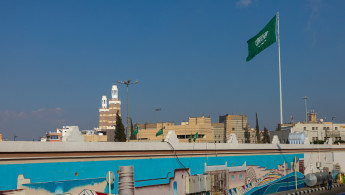Saudi Arabia to replace kafala system with work contracts: report
Saudi Arabia has announced it will replace its controversial kafala system, according to local reports.
3 min read
Saudi Arabia is preparing to host the G20 summit [Getty]
Saudi Arabia could soon abolish its controversial "kafala" sponsorship system and replace it with a work contracts, after widespread criticism from human rights groups that it leaves foreign workers open to exploitation.
Saudi financial newspaper Maaal reported on Tuesday that the new system will rely on contracts between employees and employers, citing unnamed sources.
It said that the new system could be officially announced as early as this week after approval from relevant authorities and will be implemented from the start of next year.
The daily added that the decision was postponed to allow international media to attend a press conference next week when an official announcement will be made.
The Saudi ministry of human resources and labour development said it is currently working on a number of reform initiatives to "develop the labour market" and will be announced "when ready".
"The ministry calls on everyone to obtain information from official sources," it said in a tweet.
The kafala system has been criticised for tying foreign workers to their employers, and has been dubbed "modern day slavery" by some human rights groups.
Foreign workers are tied to one employer during their duration to their stay in the kingdom leaving them open to exploitation - particularly domestic workers - campaigners argue.
The sponsorship system is widespread in the Gulf region but Qatar has announced it will end kafala by 2022 while Bahrain is also reportedly planning on reforming employment procedures.
The reports come as Saudi Arabia prepares to host next month's G20 summit, an event some analysts believe that Riyadh will use to promote a "reformed" image to the world.
Saudi Crown Prince Mohammed bin Salman has attempted to shake off some of the more conservative aspects of the kingdom - such as overturning a ban on women drivers.
Ending kafala would be another positive note for international to pick up on before the G20 summit begins, but human rights campaigners are not convinced by the "stunt".
"Great news if true, though have heard promises to end Kafala/sponsorship system for many years with no delivery. What’s the problem with the system? It's a form of slavery/indentured servitude," tweeted Sarah Leah Whitson, executive director of DAWN.
Rights' groups have urged governments to boycott the meet due to Riyadh's detention of activists, the murder of Jamal Khashoggi at the Saudi consulate two years ago, and Riyadh's role in the war in Yemen.
Women's rights campaigner Loujain Al-Hathloul has been detained since 2018 where she has been subject to torture, sexual abuse, and solitary confinement, her family say.
She began a hunger strike on Monday due to restrictions on contact with her family.
Saudi financial newspaper Maaal reported on Tuesday that the new system will rely on contracts between employees and employers, citing unnamed sources.
It said that the new system could be officially announced as early as this week after approval from relevant authorities and will be implemented from the start of next year.
The daily added that the decision was postponed to allow international media to attend a press conference next week when an official announcement will be made.
The Saudi ministry of human resources and labour development said it is currently working on a number of reform initiatives to "develop the labour market" and will be announced "when ready".
"The ministry calls on everyone to obtain information from official sources," it said in a tweet.
The kafala system has been criticised for tying foreign workers to their employers, and has been dubbed "modern day slavery" by some human rights groups.
Foreign workers are tied to one employer during their duration to their stay in the kingdom leaving them open to exploitation - particularly domestic workers - campaigners argue.
|
|
The sponsorship system is widespread in the Gulf region but Qatar has announced it will end kafala by 2022 while Bahrain is also reportedly planning on reforming employment procedures.
The reports come as Saudi Arabia prepares to host next month's G20 summit, an event some analysts believe that Riyadh will use to promote a "reformed" image to the world.
Saudi Crown Prince Mohammed bin Salman has attempted to shake off some of the more conservative aspects of the kingdom - such as overturning a ban on women drivers.
Ending kafala would be another positive note for international to pick up on before the G20 summit begins, but human rights campaigners are not convinced by the "stunt".
"Great news if true, though have heard promises to end Kafala/sponsorship system for many years with no delivery. What’s the problem with the system? It's a form of slavery/indentured servitude," tweeted Sarah Leah Whitson, executive director of DAWN.
Rights' groups have urged governments to boycott the meet due to Riyadh's detention of activists, the murder of Jamal Khashoggi at the Saudi consulate two years ago, and Riyadh's role in the war in Yemen.
Women's rights campaigner Loujain Al-Hathloul has been detained since 2018 where she has been subject to torture, sexual abuse, and solitary confinement, her family say.
She began a hunger strike on Monday due to restrictions on contact with her family.
Follow us on Facebook, Twitter and Instagram to stay connected





 Follow the Middle East's top stories in English at The New Arab on Google News
Follow the Middle East's top stories in English at The New Arab on Google News


